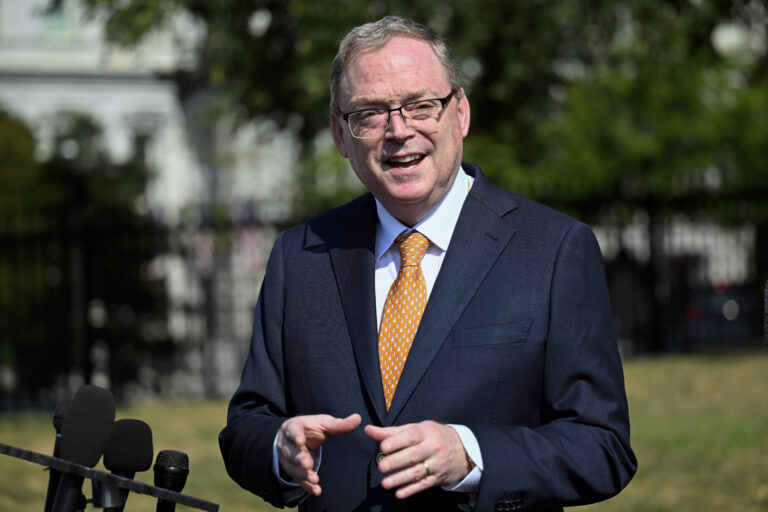White House officials are rushing to defend President Donald Trump’s decision to fire the head of the Bureau of Labor Statistics (BLS), arguing that the fact-finding agency’s revisions to recent jobs numbers were too staggering to be credible.
Kevin Hassett, director of the National Economic Council, described the revisions—which showed 258,000 fewer jobs created in May and June than previously reported—as “hard evidence” of statistical tampering by the BLS.
“I’ve been looking at [jobs data] for 40 years. And I’m like, ‘It must be a typo,'” Hassett said, during a Sunday appearance on NBC’s Meet the Press.
Newsweek has reached out to the BLS via email for comment.
Why It Matters
Trump’s firing of Erika McEntarfer, a Joe Biden appointee who had led the BLS since early 2024, has sparked broad criticism from Democrats and Republicans, with many warning that this sets a dangerous precedent for political influence over such statistical work, and undermines the trustworthiness of the agency.
What To Know
On Friday, the BLS released its report on non-farm payroll employment for July, showing that only 73,000 jobs were added in the month, well below the 110,000 that had been forecast. This, and the revisions to May and June’s data—which the agency said resulted from subsequent reports from businesses and government agencies—prompted outrage from the president.
“We need accurate Jobs Numbers. I have directed my Team to fire this Biden Political Appointee, IMMEDIATELY,” Trump posted to Truth Social. “She will be replaced with someone much more competent and qualified. Important numbers like this must be fair and accurate, they can’t be manipulated for political purposes.”
In a later post, Trump said without evidence that the figures had been “RIGGED in order to make the Republicans, and ME, look bad.”
Hassett said Trump’s decision was justified, based on “massive revisions” by the agency in recent years. He pointed to the BLS revising reported job growth between April 2023 and March 2024 down by 818,000 jobs in August of last year, following Biden’s withdrawal from the presidential race.
Hassett went on to say that “we need a fresh set of eyes over the BLS,” and that Trump “wants his own people there so that when we see the numbers, they’re more transparent and more reliable.”
U.S. Trade Representative Jamieson Greer told CBS News on Sunday that Trump “has real concerns” about the accuracy of the July report and BLS jobs data from last year.
“There are always revisions, but sometimes you see these revisions go in really extreme ways,” Greer said on Face the Nation. “And it’s, you know, the president is the president. He can choose who works in the executive branch.”

John McDonnell/AP Photo
McEntarfer reacted to her dismissal in a post to social media platform Bluesky over the weekend, describing her time with the BLS as the “honor of my life.”
Her predecessor William Beach, appointed by Trump in 2017, described the move as “totally groundless” on X, formerly Twitter, and one that “sets a dangerous precedent and undermines the statistical mission of the bureau.”
Beach later told CNN there was “no way” for McEntarfer to have rigged jobs figures as Trump alleged.
“The commissioner doesn’t do anything to collect the numbers. The commissioner doesn’t see the numbers until Wednesday before they’re published,” he said.
Both Democrats and Republicans have been equally scathing in their reactions.
“Trump’s firing of the Bureau of Labor and Statistics chief is dangerous and another sign of his anti-democratic tendencies,” New Jersey Senator Cory Booker posted to X,. House Minority Leader Hakeem Jeffries said Trump was attempting to “blame the failure of [his] presidency on a career public servant.”
“I think it’s kind of impetuous to fire the statistician without first knowing whether the numbers are accurate,” said Wyoming’s Republican Senator Cynthia Lummis. “It’s not the statistician’s fault if the numbers are accurate and that they’re not what the president had hoped for.”
What People Are Saying
Erika McEntarfer, in a Friday post on Bluesky, said: “It has been the honor of my life to serve as commissioner of BLS alongside the many dedicated civil servants tasked with measuring a vast and dynamic economy. It is vital and important work and I thank them for their service to this nation.”
Republican Senator Rand Paul of Kentucky told NBC News: “We have to look somewhere for objective statistics. When the people providing the statistics are fired, it makes it much harder to make judgments that you know, the statistics won’t be politicized.”
Former BLS Commissioner William Beach told CNN: “I don’t think there’s any grounds at all for this firing. And it really hurts the statistical system. It undermines credibility in BLS.”
“Suppose that they get a new commissioner…and they do a bad number. Well, everybody’s going to think, well, it’s not as bad as it probably really is, because they’re going to suspect political influence,” he added.
American economist and Nobel laureate Roger Myerson told Newsweek: “Firing the professional head of the Bureau of Labor Statistics because of bad news in a monthly report is absolutely the antithesis of contributing to economic sciences.”
“Telling publicly paid statisticians that their careers depend on not releasing bad news is bad for science, and in the long run it will be bad for policymaking also,” he added.
Friends of the Bureau of Labor Statistics, a nonpartisan advocacy group which supports the agency’s mission, said: “When leaders of other nations have politicized economic data, it has destroyed public trust in all official statistics and in government science.
“BLS operates as a federal statistical agency and is afforded autonomy to ensure the data it releases are as accurate as possible,” it added. “To politicize the work of the agency and its workers does a great disservice not only to BLS, but to the entire federal statistical system which this country has relied on for almost 150 years.”
What Happens Next?
Speaking to reporters on Sunday, Trump said he would be announcing a replacement for McEntarfer “sometime over the next three, four days.”


